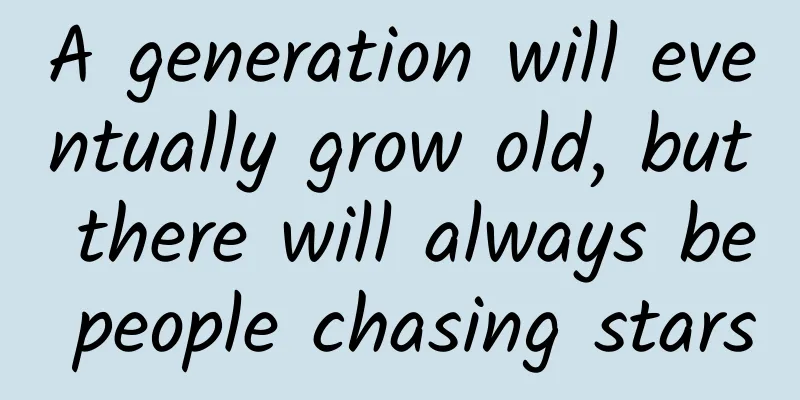A generation will eventually grow old, but there will always be people chasing stars

|
On July 31, Wu Yifan was detained for alleged rape. After the detention notice was released, some people still chose to support him: some fans chose to continue "waiting for the truth", some fans rushed to the police station to inquire and visit, and some fans "went crazy" and threatened to create an organization for "collective rescue" or even "prison break". Under this distorted concept of "my father and mother are not close to me, only my brother is close to me", some young people spend huge amounts of manpower and financial resources to chase stars, such as the scandal of crazy milk dumping in support of idols. Whenever I see a group of naive young boys and girls devoting themselves to their idols, inciting cyberbullying, and raising funds on the Internet, it makes people worried and puzzled: Why is it so difficult to make fans believe that "idols are not as perfect as imagined"?
In fact, fans may know clearly, but they are unable to change their behavior. Among the 2,386 users interviewed by FUNJI Entertainment on the "Idol Collapse·Fans' Mentality" user survey, 52.2% said that "before the idol was exposed, they thought it might be true and pretended to be calm without changing their expression." That is to say, when it comes to idol scandals, more than half of the fans often face cognitive dissonance. The theory of cognitive dissonance was first proposed by American social psychologist Festinger in 1957. Cognitive dissonance refers to the uncomfortable feeling caused by doing an action that is inconsistent with your attitude, such as you wanted to help your friend but actually did more harm than good. In general, people's attitudes and behaviors are consistent, such as going on an outing with someone you like or ignoring another person with whom you have a grudge. But sometimes attitudes and behaviors are inconsistent, such as complimenting a star even though you don't like him very much because you are afraid that his fans will scold you. When people's attitudes are inconsistent with their behaviors and they cannot find external reasons for their behaviors, it often causes psychological tension in individuals. In order to overcome the tension caused by cognitive dissonance, people need to adopt a variety of methods to reduce their cognitive dissonance. Take Wu Yifan's fans as an example. Many "die-hard fans" actually know deep down that their idol has committed countless crimes. But when they complained with other "fans" online, those "good friends" asked you to fight for your idol with them, and you forwarded a Weibo post in support of your idol. At this time, your attitude of knowing that you have done something wrong is in conflict with your star-chasing behavior, which causes cognitive dissonance. As a result, fans began to adopt the following methods to reduce the cognitive dissonance caused by the idol’s collapse, and they got deeper and deeper into it: 1. Change your attitude: Change your attitude towards right and wrong and fairness to make it consistent with your previous mindless star-chasing behavior. For example, "I just like Kris Wu, I don't care what he did." 2. Increase cognition: If two cognitions are inconsistent, the dissonance can be reduced by adding more consistent cognitions, such as "chasing stars can make me happy and make me feel that I am the focus of everyone's attention." 3. Reduce the sense of choice: Make yourself believe that the reason you do things that contradict your attitude is because you have no choice. For example, "There is so much pressure in life, I can only relieve it by chasing stars, there is no other way." 4. Change your behavior: Make your behavior no longer conflict with your attitude. For example, "I want to chase a star anyway, it doesn't matter who I chase. As long as I climb the wall fast enough, I don't have to worry about the house collapsing and getting hurt." Why does cognitive dissonance occur? Simply put: the more you put into something, the more you like it. In fact, as early as 1959, psychologist Aronson and others proved this through experiments. In the study, they asked female college students who volunteered to participate in the experiment to discuss topics related to sex - a topic that was taboo in the 1950s - and divided the subjects into three groups: a high ridicule group, a medium ridicule group, and a control group. Before the experiment began, the researchers told the subjects that in order to ensure that they were speaking from their hearts, they needed to take an "embarrassment test", but in fact the purpose of this was to divide them into groups. The high ridicule group was asked to read some obscene words loudly in public, and the medium ridicule group read some sexually related words in front of others. After taking the test, the researchers asked the subjects to wear headphones and join a group to discuss sexual issues. After the discussion, the researchers asked the subjects to rate their liking for the discussion and other group members on a scale of 0 to 100. The results showed that the subjects in the high ridicule group (97 points) gave much higher evaluations on the group discussion than the medium ridicule group (82 points) and the control group (85 points). However, there was no statistically significant difference between the medium ridicule group and the control group. Aronson pointed out that trying to do something bad will inevitably lead to higher cognitive dissonance, and in order to reduce the dissonance, people can only change their attitude towards these things, from disliking them to liking them. Analogous to irrational star-chasing, if you passively do some bad things in the process of star-chasing, causing cognitive dissonance, you may become fond of doing such things later. The rise of cognitive neuroscience has also provided new evidence for the theory of cognitive dissonance. In the study by Veen et al., the subjects had to argue that "a laboratory with a bad environment is a good place." Through functional magnetic resonance imaging (fMRI), researchers found that the dorsal anterior cingulate gyrus and anterior insula of the brain were activated during cognitive dissonance, and the activation of these brain areas could predict the change in the subjects' attitudes. In the end, chasing stars may just be a self-deceiving cognitive dissonance, like a dream, like an illusion, like lightning, like a bubble. Why are there always people chasing stars? Because celebrities live the way we want to live, what we like is often the self projected from celebrities. This self is an ideal self, the way we aspire to be. Our love for idols is never an unfounded fantasy, it often reflects our most real psychological needs. For example, when a person wants a good figure but can't control his or her appetite, he or she hopes that he or she is naturally beautiful and will not gain weight no matter how much he or she eats. At this time, if a celebrity is both slim and a foodie, it satisfies our ideal self to a great extent, and we become fans of this celebrity. When a person cannot tolerate his true image, he often looks for a substitute to compensate for his dissatisfaction with the reality. When a star's personality is very close to part of his ideal self, the connection with the idol is formed. This spiritual and emotional connection with the star is due to a small group of special cells in the brain called mirror neurons. Mirror neurons help us learn from simple imitation to the use of tools, quickly understand the intentions of others, and experience the emotions of others. Mirror neurons are activated when we see others doing the same behavior. The meaning of the word mirror is to see the behavior of others as if you are doing it yourself. The network of neurons in the brain is generally thought to store specific memories; while the mirror neuron group stores the code for specific behavior patterns, making it visual thinking and intuitive in nature. These characteristics not only allow us to perform basic actions without thinking, but also allow us to perform the same actions when we see others perform certain actions. This can also explain why people will be infected when they see others yawn, and when others laugh, they will laugh involuntarily. Thanks to the existence of mirror neurons, humans can learn new knowledge, interact with others, and exhibit complex and uniquely human behaviors such as star-chasing. Having said that, chasing stars is not always a bad thing. Of course, the existence of idols can also play a positive guiding role. As Romain Rolland wrote in the postscript of "The Life of Michelangelo": "Not ordinary people can survive on the peak, but they can go up to pay homage once a year, and from it they can gain the courage to fight in daily life." The Wu Yifan incident is actually a good start. The topic #Rectify the bad fan culture chaos# has become a hot search topic. The country has begun to think about "what kind of idols should we give to our children", and the public has begun to discuss "the moral standards of idols". At this time, we should not forget to use psychological knowledge to teach children "the correct way to chase stars". First of all, we must maintain independent thinking and be wary of “de-individualization”. "Deindividuation" means that individuals in a group sometimes lose their sense of responsibility for their own behavior, which weakens or even eliminates the function of the self-control system, leading to antisocial behaviors that they would not normally dare to do. In the process of chasing stars, the emotions of an individual will be quickly transmitted to other members of the group, causing the individual in the group to exhibit some behaviors that he or she has never exhibited when alone. When you feel even a little confused in the process of chasing stars and find yourself needing to make unusual choices, please stay calm and don't expect others to tell you what to do. Each of us is an independent individual with independent thinking and judgment. Secondly, actively cultivate communication and problem-solving skills. Research has found that in social life, those who like to use cyber violence to solve problems are often those who lack appropriate social skills. Therefore, one way to reduce cyber violence is to learn how to express anger and criticism in a constructive way, how to learn to coordinate and compromise in conflicts, and how to respond more sensitively to the needs of others. Finally, don't forget to use the connection principle in life. The association principle states that we like people who are associated with good experiences and dislike people who are associated with bad experiences. Many fans lose interest in life because they are too deeply connected to the "fan circle", which leads to the fan identity being more important than themselves and the idol's career being more important than life. Therefore, please chase fans without affecting your studies and career. If you live your life well, you will find that the ordinary touches in daily life are more dazzling than the fan circle. (Editor: Gao Peiwen) References [1] FUNJI Entertainment "Idol Collapse: A Survey of Fans' Mentality" https://mp.weixin.qq.com/s/T1ZSkBJz-DEKyNVpBdkwFQ [2] Myers. Social Psychology (11th Edition) [M]. Translated by Hou Yubo, Le Guoan, Zhang Zhiyong, et al. Beijing: People's Posts and Telecommunications Press, 2014. [3] Aronson, E., Wilson, T, D., Akert, R, M. Social psychology [M]. 8th ed. Upper Saddle River, NJ: Prentice Hall, 2013. [4] Van, V, V., Krug, M, K., Schooler, W., Carter, C, S. Neural activity predicts attitude change in cognitive dissonance. Nature neuroscience, 12(1): 1469-1474 (2009). [5] Dapretto,M.,Davies,M.,Pfeifer,J.etal.Understanding emotions in others: mirror neuron dysfunction in children with autism spectrum disorders. Nat Neurosci 9, 28-30 (2006).https://doi.org/10.1038/nn1611.[6]Iacoboni,M. Imitation, empathy, and mirror neurons. Annual review of psychology,60,653-670(2009). |
<<: Will mandarin oranges become sweeter as they age? When do mandarin oranges ripen?
>>: This year, we are all tired of judging ugliness
Recommend
What are the symptoms of pregnancy on day 2?
Many girls who are pregnant for the first time do...
How to make blood-replenishing medicinal diet for women?
Female friends are more likely to suffer from isc...
What is the current situation in South Africa, which was the first country to report the Omicron strain?
Recent South Africa and other countries report ne...
What should pregnant women do if they eat pepper?
As a pregnant woman, it is best not to eat pepper...
Will moxibustion affect menstruation?
It is very common for many people to do moxibusti...
What to do if a woman has heel pain
Heel pain in women is a big problem that bothers ...
The difference between prebiotics and probiotics
Yisheng Alkali is the flagship brand of Guangzhou...
What is the cause of acne before and after menstruation?
Everyone thinks that acne is exclusive to adolesc...
One picture to understand丨How to do the COVID-19 antigen self-test?
Source: People's Daily Client Copywriter: Pei...
What are the symptoms of an open cervix?
The opening of the cervix is actually also call...
What is the difference between eyebrow tattooing and eyebrow embroidery?
Eyebrow tattooing and eyebrow embroidery are both...
Will donkey hide gelatin affect menstruation?
Donkey-hide gelatin is a very famous medicinal he...
How should I use the early pregnancy test pen?
Now many friends have this problem. If the male s...
How to treat leucorrhea with pus and blood?
Many patients will have abnormal leucorrhea in th...









